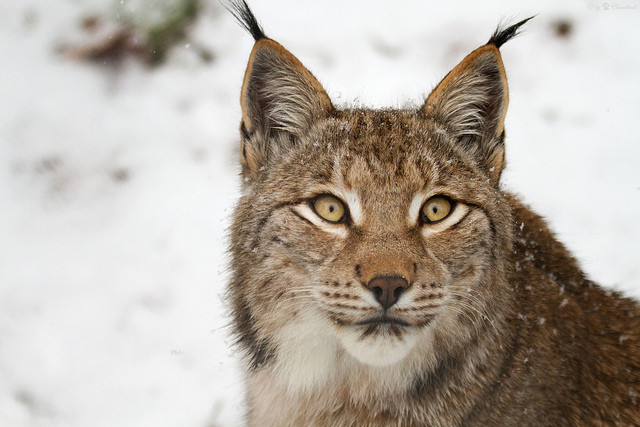Environment
The Missing Lynx

flickr/blacktigersdream
Deer, on the surface, seem like one of the most graceful and harmless animals one could come across in the UK. Any traveller on a British railway will be familiar with seeing the fragile-looking mammal graze upon a verdant field. Yet, as unassuming as they may seem deer pose perhaps the greatest threat to the biodiversity of the country. Essentially, without any natural predators – except ourselves – they have been allowed to breed and feed unhindered. Despite attempts to cull a sufficient proportion of them each year in order to maintain the semblance of natural predation their population continues to rise. This year it is estimated that around two million deer survive in the forests and countryside of Great Britain; a vastly unsustainable number.
It’s not that deer are inherently damaging animals. Rather, the over abundance of any creature is detrimental to a natural world that requires balance in order to be sustainable – as is proven by the rapacious effect our own species has had on the planet. Too many deer harm the diversity of precious woodland habitats and spoil suitable environments for other species, particularly migrant songbirds like the nightingale. Not to mention their habit of destroying sapling trees and causing thousands of road accidents a year. Should their population continue to explode these problems will accelerate. The remaining British wilderness exists in an unnatural state where deer hold dominion over the land. The king of the British forest is a reclusive herbivore. Hardly an exciting prospect for the growing ecotourism industry, is it?
So, what’s the solution?
Currently the measures being implemented to control the UK deer population are ineffective and the philosophy behind them troubling. The British Deer Society, a charity claiming to promote the existence and sustainability of deer for the generations to come, have written on their website a peculiar phrase: ‘…our requirements take precedence over those of other creatures, and truly “wild” habitats no longer exist in Britain’
The BDS evidently believe in the philosophy that has caused this mess in the first place: that we matter more than the animals we share the planet with. Restricting nature to convenient corrals like parks and fenced in forests is not really how one goes about creating ‘truly wild’ habitats. Deer are not cattle. They have been able to procreate so freely because throughout history we have scourged the British land of its natural predators and replaced them with livestock. Yet, as natural disasters and global warming related problems prove, despite our technological intelligence we are still very much at the mercy of nature. This issue of deer overpopulation is no different. Even the most prolific deerstalker will not be able to solve this problem with brute force. In order to find a solution a new philosophy is needed.
Lo and behold, this month saw the launch of the charity Rewilding Britain. The charity actively campaigns for the reintroduction of several species into the UK: from wolves to wild boar. In creating a more diverse ecological landscape they hope to rebuild the natural processes that over-time the British wilderness has lost. From supporting the establishment of areas seabed to be made free from dredging and trawling to new methods of farming that allow animals to roam freely around estates, Rewilding Britain take a wholly different view than the BDS does of how we should form a relationship with the environment. Of course, the concept of rewilding is driven by human intervention and could, therefore, be argued to be unnatural. However, if human intervention banished these habitats and species from Britain in the first place then surely it should be our responsibility to bring them back. Though rewilding isn’t just an apologetic conservation ideal. It could actually solve some of the UK’s most pressing environmental problems, like deer.
Enter the Eurasian lynx: an elusive, carnivorous feline that could once have kept the deer population in Britain within sustainable levels. Since its departure the only things killing deer in this country have been the
landed gentry, unsuspecting motorists, disgruntled farmers or people carrying out controlled culls (which, as the Deer Initiative have admitted, are largely feckless pursuits in actually controlling the population). A 2013 study stated that in order for the deer population to remain within sustainable levels in Britain up to 50% of the population would have to be shot each year. That works out, at current estimates, at around 1 million deer every year; a monumental task even for the most ardent hunter.
Rewilding Britain propose that instead of exerting the enormous amount of effort and financial resources such a gigantic cull would require, we simply allow the laws of nature to solve the problem for us. If deer have no natural predators then lets introduce one: the lynx.
This isn’t exactly a new idea. Lynx have been re-introduced to several habitats across Europe after human impact pushed them out and the Lynx UK Trust are currently attempting to get the go-ahead for a trial re-introduction to Britain. However, should this come closer to becoming a reality it can be guaranteed that sceptics would begin to make their voices heard. Despite the evident benefits lynx could provide to the UK wilderness – from managing the deer population to adding much needed diversity to our forests – already doubts are being broadcast by academics and farmers alike. The latter group will surely campaign for a compensation system, even though lynx have been found to be responsible for the mortality of less that 0.5% of the total number of available sheep in a given area (far less than deaths caused by disease). Professor Chris Thomas at the University of York has also stated that the endangered capercaillie could be under threat should lynx be introduced, although he provided no evidence for such an assumption in his article on the BBC News website. If the Lynx UK Trust begin to garner more success doubts such as these will only become more numerous.
It seems to me that the human race has a great deal to atone for when it comes to the environment. We’re directly responsible for the extinction of several species; we continually destroy wilderness in order to make way for houses with bare, lifeless gardens; we do not even respect the creatures around us enough to know their names as common knowledge. If we can make up for our plethora of ruinous errors, if only a little, then I see no justifiable barriers as to why the lynx should not be re-introduced into Britain. Plus, who wouldn’t love to catch sight of a pointy-eared predator skulking through a British forest? It’s a hell of a lot more exciting than seeing deer through the window of a train.
Environment
The Future of Fashion: The Rise of Eco-Conscious Brands in the Luxury Market

The once opulent and exclusive realm of luxury fashion is undergoing a dramatic transformation. Driven by a growing global consciousness about environmental impact, consumers are demanding more sustainable choices, even at the highest price points. This shift in consumer preferences is reshaping the industry, forcing luxury brands to reevaluate their production processes and material sourcing.
As a result, luxury eco-friendly collections are becoming increasingly sought after, and brands that prioritize sustainability are gaining a competitive edge.
Key Trends Shaping the Market
The luxury fashion market is experiencing a significant shift as sustainability becomes a core value for both brands and consumers. One of the most prominent trends is the rise of eco-friendly fashion that blend high-end design with ethical practices.
These collections are characterized by the use of sustainable materials, such as organic cotton, recycled fabrics, and innovative alternatives to traditional textiles. Brands are also focusing on reducing their environmental impact by adopting eco-friendly production methods, including water-saving technologies and carbon-neutral manufacturing processes.
Brands like Onibai are at the forefront of this movement, offering exquisite designs that not only cater to the aesthetic tastes of discerning customers, but also align with their values of sustainability. As consumers become more aware of the environmental and social implications of their purchases, they are increasingly seeking out brands that offer a blend of luxury and responsibility.
Consumer Demand Driving the Change
Consumer preferences are increasingly dictating the trajectory of the fashion industry. A growing emphasis on sustainability and ethical practices has empowered consumers to demand more from the brands they support. This shift in consumer behavior has led to a surge in demand for luxury eco-friendly products, forcing fashion houses to adapt their business models accordingly. This demand for transparency and ethical practices has compelled luxury brands to rethink their strategies and adopt more sustainable business models.
For example, a recent study by McKinsey & Company found that 66 % of global consumers are willing to pay more for sustainable products. This trend is particularly strong among millennials and Gen Z consumers, who are more likely to be environmentally conscious.
Leading the Way: Eco-Conscious Luxury Brands
Several luxury brands have emerged as leaders in the sustainable fashion movement, setting a precedent for the industry. Onibai, for instance, has distinguished itself with its commitment to sustainability, offering luxury eco-friendly collections that resonate with environmentally conscious consumers.
By prioritizing the use of organic materials, low-impact dyes, and fair labor practices, Onibai exemplifies how luxury can coexist with ethical responsibility.
The Future of Luxury Fashion
The rise of eco-conscious brands in the luxury market marks a significant turning point for the fashion industry. As more brands embrace sustainability, the definition of luxury is evolving to encompass not only quality and craftsmanship but also ethical responsibility. This shift is not just a passing trend; it represents the future of fashion, where consumers and brands alike recognize the importance of preserving our planet while enjoying the finer things in life.
In this new era of luxury fashion, eco-friendly collections like those offered by Onibai are leading the way, proving that sustainability is not a compromise but a new standard of excellence. As the demand for sustainable fashion continues to grow, the future of luxury will undoubtedly be defined by its commitment to eco-consciousness, ensuring that elegance and ethics go hand in hand.
Environment
Redefining marine recycling through painting and sculpture

Frutos María Martínez, a self-taught visual artist, has been rescuing waste from the ocean’s waters for decades, turning it into beautiful and elegant artwork. Finishing his first painting and sculpture pieces at just fourteen, Frutos has spent his entire life guided by his passion for art. Becoming a professional artist in the mid-1980s after working at car dealerships, Frutos used his skills and expertise with metal to create sculptures and paintings, inspired by the materials he found along the Mediterranean Coast.
In his pieces, Frutos combines numerous medias to create sculptures, paintings, and collages. As part of his process, María spends time exploring the beaches and waters of Alicante, a Mediterranean city along the southeastern coast of Spain and his home since 1985.
Here, he has found all sorts of materials that have gone on to become pieces in his collections. Steel, iron, wood, nets, and textiles, among other objects, that Frutos salvaged from the ocean can all be found in his art.
By reusing and recycling these found objects, the artist is able to give new life to abandoned and forgotten waste. María recognizes the environmental issues we are facing at a global level, and his art seeks to raise awareness of these challenges. As his materials are pulled straight from the Mediterranean Sea, he is especially invested in taking care of marine life and our oceans. With each item the artist salvages from the ocean, one less piece of waste is polluting the waters.

Once the flotsam is collected, Frutos returns to his workshop where he creates works of art in different forms. While other artists may send their work to be fabricated by others, María could not imagine his pieces being created in a place other than his studio. Here, he uses his innate skills with metal and machinery to forge and construct works of beauty. His sculptures follow hard lines, both straight and curved, and his paintings exude color. When making his collages, he takes his found mixed media and creates new stories. He adds paint to wood that was floating in the sea or combines various materials together, reimagining a life for objects that were once trash.
With a true passion for his work, he creates through intuition. He explains that there is a moment when his art becomes completely emotional and personal, “each piece is imbued with my experiences and emotion, all lumped together, all conveyed by means of materials, technique, design and imagination.” The works his hands awaken and renew are the convergence of his mastery and his spirit, bringing new life to discarded objects.These fascinating pieces have been shown in numerous exhibitions, most recently at the Museum of the University of Alicante. There, the artist presented Acero y pecios del mar (Steel and Sea Wrecks), where two collections were displayed jointly, one offering sculptures focused on steel as a material and the other called Nueva Vida, or New Life, a collection whose pieces were created by recycling materials salvaged from sea wreckage. With this collection, he introduced a new layer into his work, adding an element of chaos and destruction to the backstories of his materials.
An earlier exhibition, Janus, displayed over 40 of Frutos’ sculptures on the University of Alicante’s campus. This exhibit, named for the Roman god of doors, gates and transitions, was influenced by the duality of life, of beginnings and ends, and of old and new. While his finished pieces reflect this duality, the materials used to create them manifest this theme through their first death being revived into new life, a tangible and concrete example of the contrasting polarity he was inspired by.
As with his sculpture-centered exhibitions, his shows highlighting his paintings are full of found materials. Pieces that Frutos creates hang with the weight of rescued and recycled materials, such as rusty iron, steel, and wood. This media has been taken from the ocean and included in his art, conjoining with resin, sands, and paint in bold and striking colors.
Frutos María’s ability to not only find new meaning in recycled and salvaged objects, but to clean up the oceans and make the environment less polluted, translate through his moving pieces of artwork, and because of this, he has made a name for himself in the art world.
Environment
Wind energy, the best way to invest into renewable energies

Over the last few years, wind energy has become the type of energy everyone can not stop talking about. This type of energy brings lots of benefits into the table when compared to more traditional sources of energy, like the energy proceeding from radiation or charcoal. Wind energy is cheap to produce, the most efficient renewable energy, and, most importantly, it is an ecological sensitive alternative.
Why should you invest in wind energy?
Wind energy is the energy of tomorrow. This type of energy made their big appearance during the XX century, when wind turbines would be used to bring energy to areas located far from the electricity grid, such as isolated farms, houses or factories.
During the XXI century, wind energy’s popularity kept on rising. Wind energy is as cheap to produce as traditional sources of energy, like radiation or charcoal burning, while falling into the category of renewable energies. This made wind energy become a top contender in the energy industry.
The wind industry’s future looks to be brighter than ever. The current generation is pretty aware of pollution and the effect it has on climate change. This has caused that governments all around the world start promoting new legislations and campaigns promoting renewable energy and, since wind energy is the most efficient type of renewable energy, it is expected that it will become the main source of energy by 2030. Now is the best moment to jump into the wind energy trend!
Making sure you set up an efficient wind farm
As it has been previously stated, wind energy is definitely an option you should consider if you are looking to power up any of your properties or business. However, setting up a wind farm isn’t a small investment, therefore, before starting this process we need to gather all the information we can about its viability. That is why we can not stop recommending that you consult with professional companies like Vortex FDC.
Vortex FDC is a company that has made a name for itself in the wind industry sector. Vortex assists their customers with all the information regarding wind resource they could need.
For example, an important factor we need to consider before setting our wind farm is the terrain. Not all terrains are appropriate to locate a wind farm, therefore, the terrain would need to be assessed before an installation that could result in a waste of assets if the terrain is not appropriate for it. Vortex FDC helps their customers evaluate where the wind farm is going to be placed, and providing information about the wind to choose the type of turbines that would yield better results in that area. Factors like the type of wind (extreme winds, turbulences, etc) or the temperature need to be taken into account when deciding which type of turbine would be more suitable for our wind farm. For example, if we plan to build a wind farm in an area that gets freezing and snowy in winter, we would need to get a turbine system that is cold resistant.
Vortex FDC runs a numerical weather model to feature all the variables that could affect the production levels of your wind farm, regardless of it being situated off-shore or in-shore. Thanks to their always up-to-date technology, you will be able to avoid unpleasant surprises regarding the energy production of your wind farm.
Overall, opting to use wind energy is an amazing idea that will benefit not only our budget, but also the planet. But, in order to do so, we need to make sure that wind farms are viable, and for that, we need to rely on professionals like Vortex FDC.




















